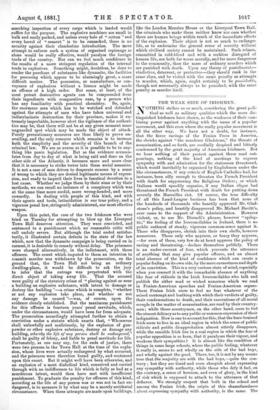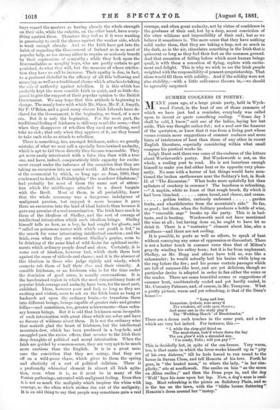THE WEAK SIDE OF IRISHMEN.
NOTHING strikes us so much, considering the great poli-
tical as well as military qualities which the more dis- tinguished Irishmen have shown, as the weakness of their com- bining power against anything with the name of a popular movement, and this even where the really popular movement is all the other way. We have not a doubt, for instance, that the fierce ravings of the Fenian Press in America,. the shrieks against " the murderer Gladstone," the threats of assassination, and so forth, are cordially despised and bitterly condemned by the great majority of American Irishmen. But we hear nothing of their protest against these mad out- pourings, nothing of the kind of meetings to express sympathy with and admiration for the statesman threatened, which would inevitably be organised by Englishmen under the like circumstances, if any coterie of English Catholics had, for instance, been silly enough to threaten the French President with death for suppressing the Religious Orders ; or which. Italians would speedily organise, if any Italian clique had threatened the French President with death for putting down severely the Marseilles riot. Of course, the true difficulty of all this Land-League business has been that none of the hundreds of thousands who heartily approved Mr. Glad-- stone's policy, and heartily disapproved Mr. Michael Davitt's, ever came to the support of the Administration. However violent, or, to use Mr. Disraeli's phrase, however " epilep- tic," the feeling of the Irreconcilables in Ireland, there is no public outburst of steady, vigorous common-sense against it Those who disapprove, shrink into their own shells, however numerous. Those only who approve, or fancy they approve, —for even of these, very few do at heart approve the policy of raving and threatening,—declare themselves publicly. There is an under-current of fear, which prevents the utterance of anything that may give popular offence, and an almost total absence of the kind of confidence which can create a popular feeling on its own side, by the mere earnestness and depth of its conviction. This is a very curious state of mind, especially when you connect it with the remarkable absence of anything like fear of ridicule in the Irish Irreconcilables who talk and publish the either mad or wicked nonsense which we read. in Fenian-American speeches and Fenian-American organs. These Fenian Irish seem to feel no fear whatever of the mixed contempt and loathing with which their verdicts of guilty, their condemnations to death, and their execrations of all moral scruple in the matter of assassination, are read by their country- men ; while those countrymen, on the other hand, seem to feel the utmost delicacy as to any public or common expression of their indignation. How is one to account for this, that the hare-brained. Irish seem to live in an ideal region in which the sense of public ridicule and public disapprobation almost utterly disappears, while the sensible Irish live in a real region in which the fear of popular opposition is so keen, that it paralyses their vigour, and weakens their sympathies ? It is almost like the condition of things in some large schools, where the public feeling, whatever it really is, seems to act wholly on the side of the bad boys, and wholly against the good. There, too, it is not by any means true that the majority are with the bad boys,—quite the con- trary ; but they are timid and even sheepish about expressing any sympathy with authority, while those who defy it feel, on the contrary, a sense of heroism, and even of glory, in the kind of risk which is supposed to attach to the utterance of that defiance. We strongly suspect that both in the school and among the Fenian Irish, the origin of this shamefacedness about expressing sympathy with authority, is the same. The
boys regard the masters as having already the whole strength on their side, while the culprits, on the other hand, have every- thing against them. Therefore they feel as if it were wanting in generosity to swell the chores against the weaker side, which is weak enough already. And so the Irish have got into the habit of regarding the Government of Ireland as in no need of popular help, as too strong either to require or seriously benefit by their expressions of sympathy ; while they look upon the Irreconcilables as naughty boys, who are pretty certain to get punished, do what they will, but the measure of whose retribu- tion they have no call to increase. Their apathy is due, in fact, to a profound disbelief in the efficacy of all this bellowing and menacing, as well as a traditional shame which attaches to taking the side of authority against rebellion. It is this which has probably kept the more sensible Irish so quiet, and so little dis- posed to give the support of their popular opinion to the British Government. We may hope that this attitude is beginning to change. The manly force with which Mr. Shaw, Mr. P. J. Smyth, Sir P. O'Brien, and a good many sincere Irish Liberals have de- clared for the Government, is the beginning, we trust, of a new era. But it is only the beginning. For the most part, the traditional feeling of Irishmen is still very much the same,—that when they disapprove of rebellion they need say nothing, need take no risk ; that only when they approve of it, are they bound to take such risks as attach to rebellion.
There is something, too, amongst Irishmen, unless we greatly mistake, of what we may call a specially hare-brained audacity, which is apt to fail them directly they become reasonable. They get more easily intoxicated with a false idea than with a true one, and have, indeed, comparatively little capacity for excite- ment except under the influence of the suspicion that they are taking an excursion into an unreal world. All the solemn farce of the ceremonial by which, so long ago as June, 1880, they condemned to death in Philadelphia " the murderer Gladstone," had probably for most of them the same sort of attrac- tion which the middle-ages attached to a direct bargain with the Devil. Most of them, in all probability, knew that the whole ceremony was a dangerous indulgence of malignant passion, but enjoyed it more because it gave them an excursion into the land of ideal hatreds than because it gave any promise of a real assassination. The Irish have much in them of the idealism of Shelley, and the sort of courage of intellectual intoxication which such idealism brings. Shelley himself tells us how, as a boy, he had sought for ghosts, and " called on poisonous names with which our youth is fed," in the search for some intoxicating intellectual emotion ; and the Irish, even when they are without Shelley's genius, seem to be drinking of the same kind of wild desire for spiritual excite- ments which ordinary people dread and shun. Certainly, it is some sort of idealism, however bad, which steels them best against the sense of ridicule and shame ; and it is the absence of this idealism in those who judge rightly and wisely, which seems to rob them of half their élan and their vivacity. A sensible Irishman, or an Irishman who is for the time under the dominion of good _sense, is usually over-cautions. It is the harebrained region in which the most extraordinary feats of popular Irish courage and audacity have been, for the most part, exhibited. Ideas, however poor and bad, so long as they are exciting and violent, seem to act on the Irish brain as bang or hasheesh act upon the ordinary brain,—to transform them into different beings, beings capable of greater risks andgreater follies—and sometimes, too, greater achievements—than ordin- ary human beings. But it is odd that Irishmen seem incapable of such intoxication with great ideas which are sober and have no flavour of wildness about them. It is not the ordinary wine that maketh glad the heart of Irishmen, but the intellectual mountain-dew, which has been produced in a bog-hole, and smuggled past the excise officer, that secures to the Irish their deep draughts of political and moral intoxication. When the Irish are guided by common-sense, they are very apt to be much more cautions than the English. It is in a great mea- sure the conviction that they are astray, that they are off on a wild-goose chase, which gives to them the spring and elasticity of a sort of .political delirium. There is a profoundly whimsical element in almost all Irish agita- tion, even when it is, as it must be in many of the Fenian gatherings, saturated with malignant feeling. Even then it is not so much the malignity which inspires the whim with courage, as the whim which strikes fire out of the malignity. It is an odd thing to say that people may sometimes gain a real
courage, and often great audacity, not by virtue of confidence in the goodness of their end, bat by a deep, secret conviction of the utter wildness and impossibility of their end; but so we believe it sometimes is. The mere sense that they have nothing solid under them, that they are taking a leap, not so much in the dark, as in the air, stimulates something in the Irish that is quiescent so long as they feel their feet on the common ground. And that sensation of falling before which most human beings quail, is with them a sensation of flying, replete with excite- ment and delight. This is why we wish to see the Irish people weighted with the responsibility of peasant-proprietorship. That alone would fill them with solidity. And if the solidity were not also stolidity,—with a little sullenness thrown in,—we should be agreeably surprised.































 Previous page
Previous page